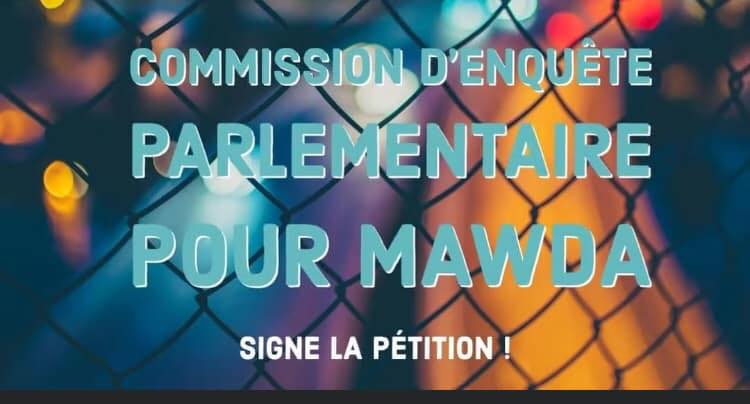Vendredi 12 février 2021, lors du rendu du jugement dans la partie de l’affaire liée à l’« incident de tir », le tribunal de Mons a clairement reconnu les limites de sa saisine par rapport au cas du meurtre de Mawda.
Le tribunal de Mons a en effet déclaré que « que les parties civiles ont largement plaidé sur la manière dont les migrants ont été traités (que ce soit au moment de leur interpellation, quand les parents de Mawda n’ont pas pu monter dans l’ambulance, etc) ainsi que sur le contexte plus général du traitement des migrants par les autorités belges et européennes. Aussi légitimes que leurs questions puissent être, il n’appartient cependant pas à ce tribunal de se prononcer sur ces éléments dès lors qu’ils dépassent largement le cadre de sa saisine fixée par l’ordonnance de la saisie de la chambre du conseil qui ne concerne que le comportement des 3 prévenus lors des faits de la nuit du 17 mai 2018 ».
Même si cette déclaration demeure évasive et peu précise, elle indique toutefois clairement que le contexte des opérations de filature transfrontalière et de chasse aux migrants ainsi que le rôle des acteurs qui les organisent, dans le cas du meurtre de Mawda, restent encore à instruire. C’est la raison pour laquelle nous plaidions, depuis juillet dernier, pour que l’affaire soit renvoyée, par la Chambre du Conseil du 08 juillet 2020, en Cour d’Assises. Si le policier qui a armé, tiré et tué Mawda est bien responsable, à titre individuel, de ce crime, comme l’a en partie reconnu le tribunal de Mons, la balle qu’il a tirée a quant à elle été extraite des opérations Medusa.
Au lendemain du jugement du 12 février, et dans l’attente du jugement à Liège dans le volet sur la « traite des êtres humains » (24 février), nous apprenons que certaines initiatives parlementaires seraient enfin en cours afin d’ouvrir un premier périmètre d’investigation sur les circonstances politiques ayant entrainé la mort de Mawda. Dès fin juin 2018 nous avons écrit à l’ensemble des présidents de partis tant du côté francophone que du côté néerlandophone pour faire part de notre demande de mise en place d’une commission d’enquête parlementaire au vu de ce que nous savions déjà être de faux témoignages, de faux coupables, des coalitions de fonctionnaires, etc. Nous n’avons eu des réponses que de Défi, Groen et Ecolo qui disaient attendre la « vérité judicaire ». Les autres partis ne nous ont tout simplement jamais répondu.
Depuis la fin de l’instruction, c’est-à-dire depuis juillet 2020, nous avons intensifié cette demande de commission d’enquête parlementaire, vu qu’il n’existait plus aucune supposée entrave juridique à sa mise en place (pour rappel, dans le cadre de l’affaire Dutroux la commission d’enquête parlementaire a eu lieu en même temps que l’instruction, un peu à l’instar des enquêtes du Comité P). Mais les parlementaires, tous partis confondus, ont préféré attendre le rendu du jugement. Nous apprenons par le dernier article de Michel Bouffioux (12 février 2021) qu’une proposition à l’initiative du PTB serait en cours de dépôt, en tout cas a-t-elle été publiée dès le surlendemain du rendu du jugement sur le leur site. Cette proposition ne semble pas en l’état constituer une majorité, ni même être portée par d’autres partis. Ecolo avait déjà préalablement, en avril 2020, demandé à ce qu’une enquête complémentaire du Comité P soit également mise en place pour éclaircir les faits. Ecolo avait également demandé à cette occasion que le Comité P entame une enquête de contrôle sur les circonstances du décès du jeune Adil. Enfin de son côté, le sp.a entend poser un certain nombre de questions nécessaires au ministre de l’Intérieur sur les méthodes utilisées lors des opération de filature (opération Hermès/Pèche-Melba entre autre) ainsi que sur l’échange d’information entre services de police. En effet, ce cadre judicaire et politique doit être interrogé car d’autres tragédies ont eu lieu dans des circonstances similaires comme celle de l’Essex (39 migrants vietnamiens furent retrouvés morts dans un camion frigorifique, près de Londres, alors qu’ils avaient séjourné à Anderlecht pendant quelques jours en connaissance de cause des polices néerlandaise et belge).
Nous avons quelque peu l’impression d’assister à un ensemble d’initiatives dispersées. Nous craignons que cet éparpillement n’empêche la construction d’une majorité parlementaire !
Nous avec besoin d’un travail parlementaire approfondi concernant le cadre des opérations de chasse et de filature des migrants et de leurs impacts sur les opérations de police. L’affaire Mawda n’est qu’une petite fenêtre par laquelle ce cadre gouvernemental à la fois politique, policier et judicaire a pu être problématisé et perçu dans ses conséquences criminelles.
Pour un travail parlementaire sérieux, nous avons a minima besoin de savoir quelles ont été les différentes directives à l’égard de la police des autoroutes, des chemins de fer, des aéroports, des ports, etc. édictées par les différents ministres de l’Intérieur : Jan Jambon, Pieter De Crem, Annelies Verlinden.
Nous avons besoin que se mettent en place des pouvoirs d’instruction pour enquêter sur les autres cas de morts suspectes durant des opérations de chasse aux migrants ou de filature.
Nous avons besoin d’entendre les médecins, pédiatres, urgentistes tout comme nous avons besoin d’entendre les policiers qui ont communiqué de fausses informations sur l’origine du décès de Mawda.
Nous avons besoin d’une enquête spécifique sur les multiples coalitions de fonctionnaires qui ont eu lieu en amont des auditions par le comité P et après, notamment sur les tentatives d’influencer des témoins.
Nous avons besoin que soit entendu le magistrat de garde ainsi que les procureurs du roi de Tournai et de Mons pour qu’ils s’expliquent sur la façon dont ils ont engagé l’enquête.
Nous avons besoin d’entendre les procureurs de Gand et de Dunkerque sur cette opération de démantèlement d’une filière de passage kurde vers l’Angleterre, sur les méthodes utilisées, sur l’arrestation du chef présumé de cette filière deux jours plus tôt à Dunkerque et sur les tentatives de scinder l’affaire.
Nous avons également besoin d’entendre un certain nombre d’experts : criminologues, telle Fabienne Brion, et sociologues pour qualifier cette logique de prohibition de la migration (« crimigration ») et questionner les effets et le sens de la lutte contre le « trafic d’êtres humains » ; personnes qui ont enquêté en profondeur comme le journaliste Michel Bouffioux ainsi qu’activistes comme celles du Refugee Women’s Centre pour leur une expertise quotidienne de l’effet de ces politiques de criminalisation sur les graves mises en danger des migrants. Cela nécessitera une alliance forte des forces progressistes, loin des guerres partisanes. Une telle enquête en profondeur est indispensable pour parvenir à démanteler les dispositifs nécropolitiques de guerre aux migrants qui rendent leur vie proprement invivable en Belgique comme en France.
Nous n’avons pas le droit d’échouer car des morts il y en a déjà eu depuis l’assassinat de Mawda et ils sont de plus en plus nombreux aujourd’hui qui, migrants, n’ont plus d’autres choix que de traverser la Manche sur des embarcations de fortune.
Le Comité Mawda – Vérité et Justice, le Groupe Montois de soutien aux Sans-papiers ainsi que le Refugee Women’s Centre se tiennent prêts en vue d’alimenter ce processus d’enquête et aideront à la constitution d’une majorité parlementaire (notamment, par exemple, via un jeudi de l’hémicycle consacré à cette question).
Comité Mawda – Justice et Vérité, Groupe Montois de Soutien aux Sans-papiers, Refugee Women’s Centre
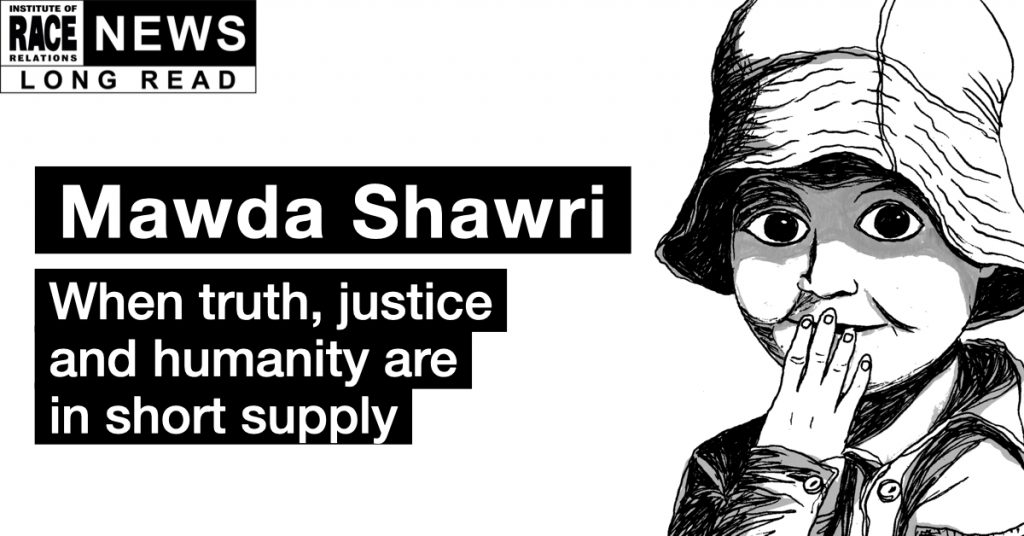
At the conclusion of the trial of the Belgian police officer who shot and killed two-year-old Kurdish Iraqi Mawda Shawri, a case that has become a symbol of the violence and injustice faced by those crossing borders within Europe to seek a better life, a campaigner Frances Timberlake reflects on a flawed process and provides a timely reminder that the UK is deeply implicated in European border policing.
On Friday 12 February, the criminal court in Mons, Belgium, delivered its verdict on the death of Mawda Shawri, a two-year-old Kurdish Iraqi girl killed by a policeman’s bullet in May 2018. The two and a half years of investigations that followed her death have been marked by internal contradictions in the versions of events testified by the police, as well as between those versions and what witnesses including Mawda’s parents have consistently said. Along the way, Mawda’s family and other migrants that were travelling with them in the hope of reaching the UK have been blamed for the death of the young girl, an interpretation which culminated last week in a four-year prison sentence for a young Kurdish man accused of driving the van that was shot at with Mawda inside. The court meanwhile concluded that the policeman’s act in shooting her constituted ‘involuntary manslaughter’ and gave him a twelve-month suspended sentence, continuing a trend of denying or minimising responsibility for police violence in the context of anti-migrant border operations. This article recounts the treatment of Mawda’s family following her death and the intricate web of contradictory stories that were released by public authorities and later used to argue the innocence of the policeman who fired the shot. Beyond the trial, which avoided positioning itself on the border and immigration policies that generated this story, the UK’s financial and political role in generating this violence at its borders with the intention of deterring immigration onto its own soil must not go unscrutinised.
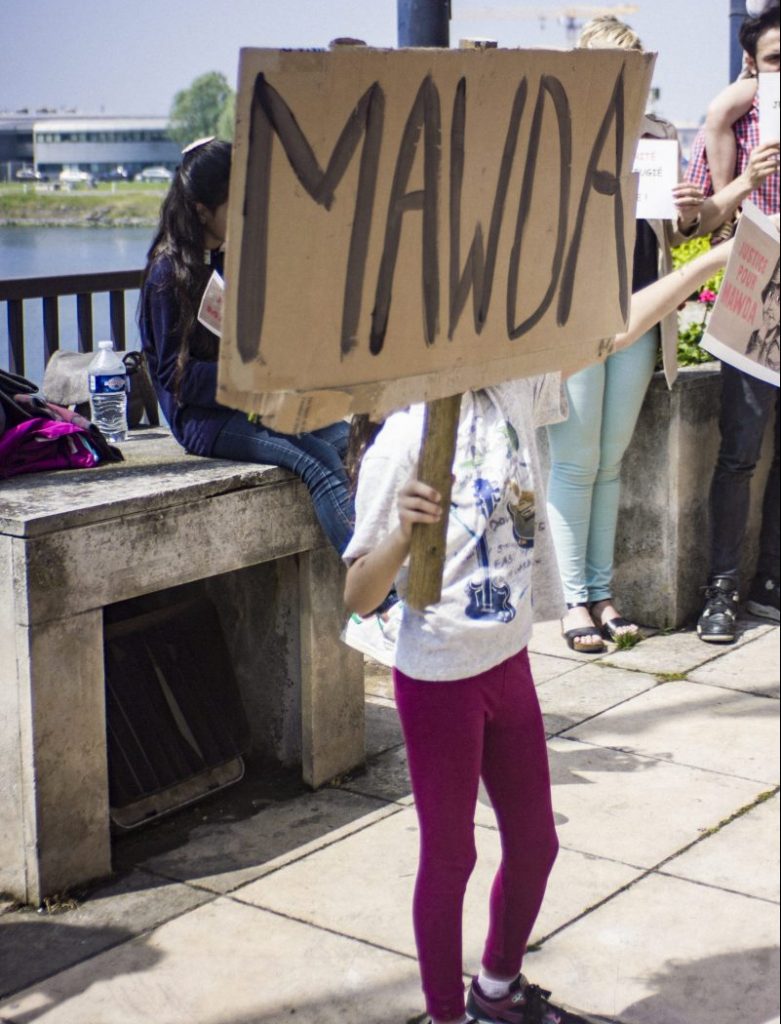
How Mawda died and how her death was framed
On the night of 16-17 May 2018, Mawda, a two-year-old girl who was sitting in her mother’s arms, was killed by a bullet from a policeman’s gun during a car chase near Mons on the France-Belgium border. The bullet, apparently aimed at the wheel of a van carrying around thirty migrants, was fired through the window and hit her cheek. From that moment, a series of painfully dehumanising measures were inflicted on the family even as extraordinary attempts were made to control the official narrative about the chain of events that led to Mawda’s death – so as to deflect blame from the police operation that preceded it.
Mawda’s family, along with several others, had been travelling in the back of a small van driving them to a lorry park where they were to hide aboard a freight truck, hoping to be able to reach the UK to claim asylum. They were one group of many who attempt this journey nightly, at that time mostly passing through Dunkirk where for the last ten years there has been a small population of mainly Kurdish Iraqi and Kurdish Iranian migrants living in informal tented camps, waiting for a chance to reach the UK.
The police claimed that the officer had fired at the wheels of the van in order to bring the van to a halt. As the terrified migrants on board came out of the van, the police surrounded them, and according to Mawda’s father, the child was taken from his arms and he was hit multiple times by the police. When an ambulance was finally called, both parents were forcibly prevented from accompanying Mawda; instead they were arrested and taken to an immigration detention centre where they were held separately. It was only two days later that they were allowed to see Mawda’s body.
In the immediate aftermath of the death, and in the days that followed, a series of statements were made both by a police spokesperson and the Mons public prosecutor’s office that contradicted Mawda’s parents’ testimony that their daughter had been killed by a shot through the head.
- At 2.15 am on 17 May, paramedics arrived on the scene ten minutes after the van was immobilised. Police agents present declared to the paramedics that there had been no gunshot during the chase and that the young girl had fallen from the window of the van, despite there being no witnesses to any fall. This was immediately supported by the Mons crown prosecutor, who claimed that the forensic doctor who arrived at the scene ‘ruled out the possibility of a shot to the head’ – a statement the doctor would later deny.
- At 3 am, a police officer informed the officer charged with writing up the account of the incident that there had in fact been a police shot fired during the chase, and another potentially from people inside the van. Despite this, the public prosecutor continued to ‘exclude the possibility of a wound caused by a shot from a policeman’ at the press conference on 17 May. Although there were no witnesses to a second shot, and no firearms found in the van or on any of the migrants, the public prosecutor’s office still entertained the ‘second shot’ theory in a press conference on 18 May. This was quickly picked up by the media and used to form a story around Mawda being caught in crossfire between migrants and police.
- In parallel, a narrative of Mawda being used as a ‘human shield’ was introduced, and is still cited now. The officer writing the account immediately following the incident wrote an initial version as follows: ‘During the chase (…) they break the windows with the head of a child and they pretend to throw it out towards the police cars. The blows the child received result in a head injury and the death of the child.’ In this version, the migrants killed their own child by using her head as a battering ram. Interestingly, when the policeman who fired the shot was finally charged with involuntary homicide, his legal team presented as his defence the argument that he did not know there were any children in the van. There were in fact four young children in the van.
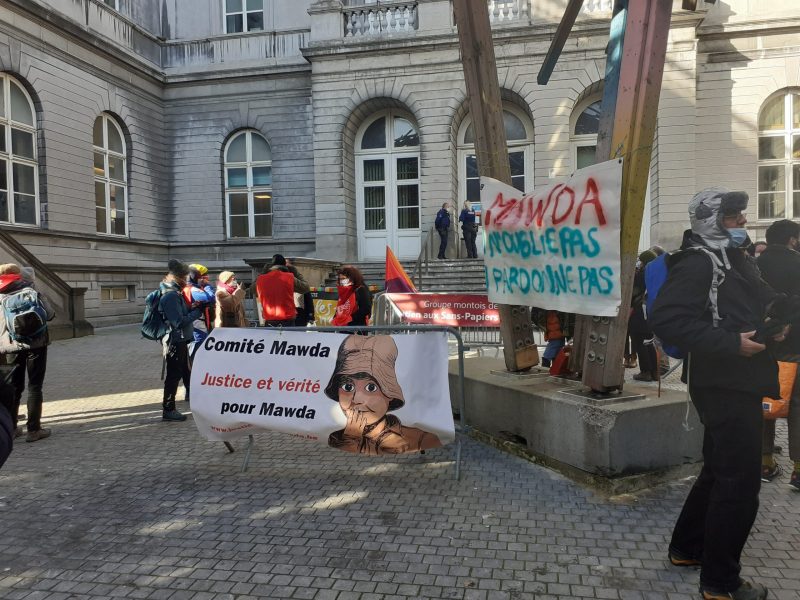
The family fights on
Looking back now, almost three years later, one would be entitled to regard the above as shameless fabrications, placed strategically in the media domain in the hope that if flawed assertions are repeated often enough they will come to be regarded as incontrovertible facts. Indeed, the official narrative did come to serve this purpose, with the confusion of the facts replicated not just in the media but in the course of the legal investigation.
It was a narrative that served also to cast doubt on and discredit the family, their own testimony and those of other migrant witnesses who had been in the van that night. The blame that was immediately placed on the family for the death of their own daughter built on a well-established caricature of the reckless ‘illegal migrant’. A large part of the media were happy to peddle this trope. By so doing, they legitimised the authorities’ treatment of Mawda’s parents and her then three-year-old brother as undesirable and disposable, both in the immediate aftermath of the killing, and in the days and months that followed. When the family was finally released from detention, they were issued with an order to leave Belgian territory, a decision all the more gruelling in that they had not even the right to bury their own child as Mawda’s body was still being held in the country for investigation. But the family, now supported by the Comité Justice et Vérité pour Mawda, bravely fought on. After a long legal battle, in February 2019 they were granted temporary visas to remain in Belgium. In January 2020, the police officer was charged with involuntary homicide, a charge contested by the family and campaigners who maintained that it should be increased to reflect a deliberate killing. The family’s lawyer argued that ‘to take out his weapon, load it and fire it towards a van full of migrants represents more than just a lack of due care and should not be minimised’.
In the courtroom – the bias continues
Two and a half years later, on the 23 November 2020, the trial to establish responsibility for the killing of Mawda finally began.
The Belgian criminal justice system differs from the UK system in that it follows an inquisitorial, rather than an adversarial approach. Under an inquisitorial system the public prosecutor plays an important role in the courtroom. This gives context to a situation where the public prosecutor who carried out the initial investigation into Mawda’s death, and as we have seen, introduced flawed facts into the public domain, sat alongside the judge, both tasked with establishing culpability. It also explains why campaigners had called for the prosecutor’s office itself to be investigated, arguing that this very institution should have sat amongst the accused at the trial.
And who were the accused? First there was the Belgian police officer, charged with involuntary manslaughter, with the prosecutor seeking a one-year suspended sentence. But there were also others. He was arraigned alongside two Kurdish men, the alleged van driver and smuggler, for whom the crown prosecutor sought sentences of ten and seven years respectively for ‘dangerous driving endangering the lives of others’.[1] However, lawyers contested the assertion that either of these two men had even been present that night as indeed none of the witness testimonies identify the man accused of driving the van.
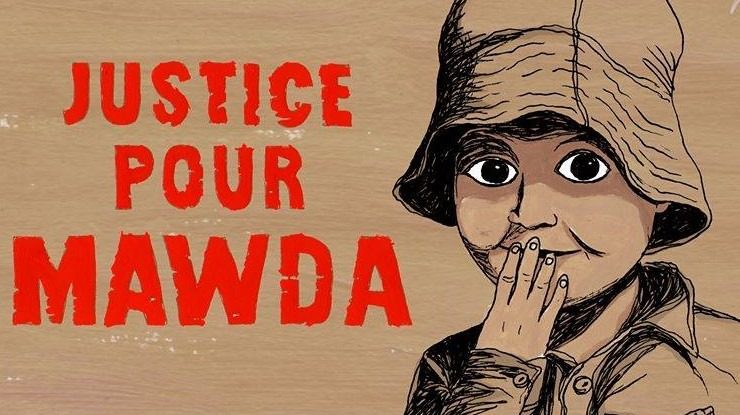
Once again, one would be forgiven for thinking that the accusations, and court proceedings, were emblematic of a wider (in)justice system designed to uphold the impunity of the state and deny responsibility for systemic racism. The court afforded the White policeman a generous amount of time to plead his own innocence, with his own pleadings heavily relying on the fact that he was the grandson of immigrants and therefore would never have intentionally shot at a migrant. In contrast, the two Kurdish migrants were cut short when they attempted to explain their own stories, with the judge deeming them ‘irrelevant’ to the case. The arguments against both migrant men relied almost entirely on the depiction of them as illegal migrants involved in criminal cross-border trade, even though their involvement in smuggling had not yet been established.
In the final verdict, the alleged smuggler was acquitted for lack of evidence that he had played any role in the affair, as only a single witness statement had identified him as someone present that night. The alleged driver meanwhile was sentenced for dangerous driving provoking an accident, based on police testimonies (unsupported by witnesses inside the van) that he had zigzagged in the road, and swerved towards the police vehicle at the moment the accused policeman was holding out his gun to frighten the driver into slowing down. It was at this moment that the policeman fired the shot, judged to be the involuntary result of the van swerving. Mawda’s father, however, who was in the van with her, testified that ‘I saw the policeman point his gun. He did not hesitate in drawing it. I saw him shoot and the bullet hit my daughter.’ Although the Mons judge ruled that the officer should not have used his firearm as there were other ways of stopping the van, the ‘dangerous’ migrant driver bears the weight of responsibility for Mawda’s death, with his behaviour seemingly used to excuse the Belgian policeman’s shot – as though the brutality displayed was mistaken deviance from technical rules, rather than a product of policies intended to deter and harm migrants. This division of criminal responsibility was reflected in the sentences: four years for the driver; one year suspended and a EUR 400 fine for the officer whose shot killed the child.
Border violence: what is the UK’s role?
Border zones lie at the heart of policies that harm and kill. The police operation that resulted in Mawda’s death was one of many that take place at the UK-France-Belgium border, the coordinated attempts by these three countries to intercept and dissuade migrants attempting to board lorries or boats to travel to the UK. In the past, migrants have attempted the crossing via the northern French ports of Dunkirk and Calais, but as port security was heightened under UK pressure (and funding), they were increasingly forced to travel via Belgium. The Belgian government responded particularly forcefully to this by launching the euphemistically named Operation Médusa, the disturbing facts of which only came into the public realm after Mawda’s death thanks to independent journalistic investigations. We now know that the van in which Mawda and her family were travelling was being tracked by both French and Belgian authorities as part of this operation. This meant a car chase was likely, if not expected.
The UK, which is behind much of the crackdown on those attempting to reach its territory, has much to answer for in this border region. Over the last thirty years successive UK governments have externalised the UK’s physical border controls and detention estate into France and Belgium, simultaneously extending insidious forms of financial and political influence without any corresponding legal or moral accountability. The model of immigration deterrence along the northern French border region based on securitisation, surveillance and policing is a direct exportation of the UK’s own ‘Hostile Environment’ abroad, at an estimated cost of £360 million since 2010. Campaigns to increase prosecutions of ‘traffickers’ or ‘criminal facilitators’ serve to brand all those forced to cross borders irregularly as dangerous, whilst in reality rendering the crossing of borders even more dangerous by pushing it so far outside of the law.
Indeed, since the increased crackdown against migrants travelling by freight vehicles on the southern Belgian border, and heightened security at the large ports in Calais and Dunkirk funded and implemented by the UK government, we have seen a rise in attempted small boat crossings. Further tragic, and yet not unpredictable, deaths have taken place as a result, including that of an entire family in October 2020 who drowned during a particularly rough boat crossing. Once again, blame was afterwards placed on the ‘callous criminals’ (the words of British home secretary Priti Patel) who facilitated the journey rather than the anti-immigration policies that push people into their business model.
Recently, the UK committed to beefing up French border policing through £28 million of government payments, despite documented harassment and life-threatening negligence on the part of French police in the northern coastal area. Once again, policing is promoted as the solution to a set of issues that are perpetuated by the political and judicial systems that police themselves uphold. Just as Mawda’s trial has been co-opted by those adjudicating it in order to reinforce the need for immigration and border policing, rather than examine its deadly effects.
What is at stake in the Mawda case is twofold. At one level, a grief-stricken family is denied not only justice after the death of their daughter, but also any belief that the system they are caught up in can ever treat them with humanity and dignity, given that they are only ever seen as ‘illegal migrants’. On another level, the final verdict has only served to condone years of lethal immigration operations against those attempting to seek asylum in the UK, or in any country other than the one they are currently in. It has exposed the measures that states, bolstered by deep-seated political and legislative racism, are prepared to take to keep them out of sight and out of mind.
Related Links
To add your voice to the call for a parliamentary Inquiry in Belgium into Mawda’s death, sign the petition here.
To follow updates on the case, follow Justice for Mawda.
Frances Timberlake has been working with displaced communities on the northern French coastline since 2016, formerly as a caseworker with the Refugee Women’s Centre and currently as a policy campaigner with Refugee Rights Europe. At the time of Mawda’s death and since, Frances has worked closely with Mawda’s family, and participates in the Comité Justice et Vérité pour Mawda.
[1] The crime is known as ‘entrave méchante à la circulation’ under article 406 of Belgium’s penal code.
Headline image: Taken from the Justice for Mawda campaign, based on a photo of her. Credit: Comité Mawda – Justice et Vérité Facebook page

